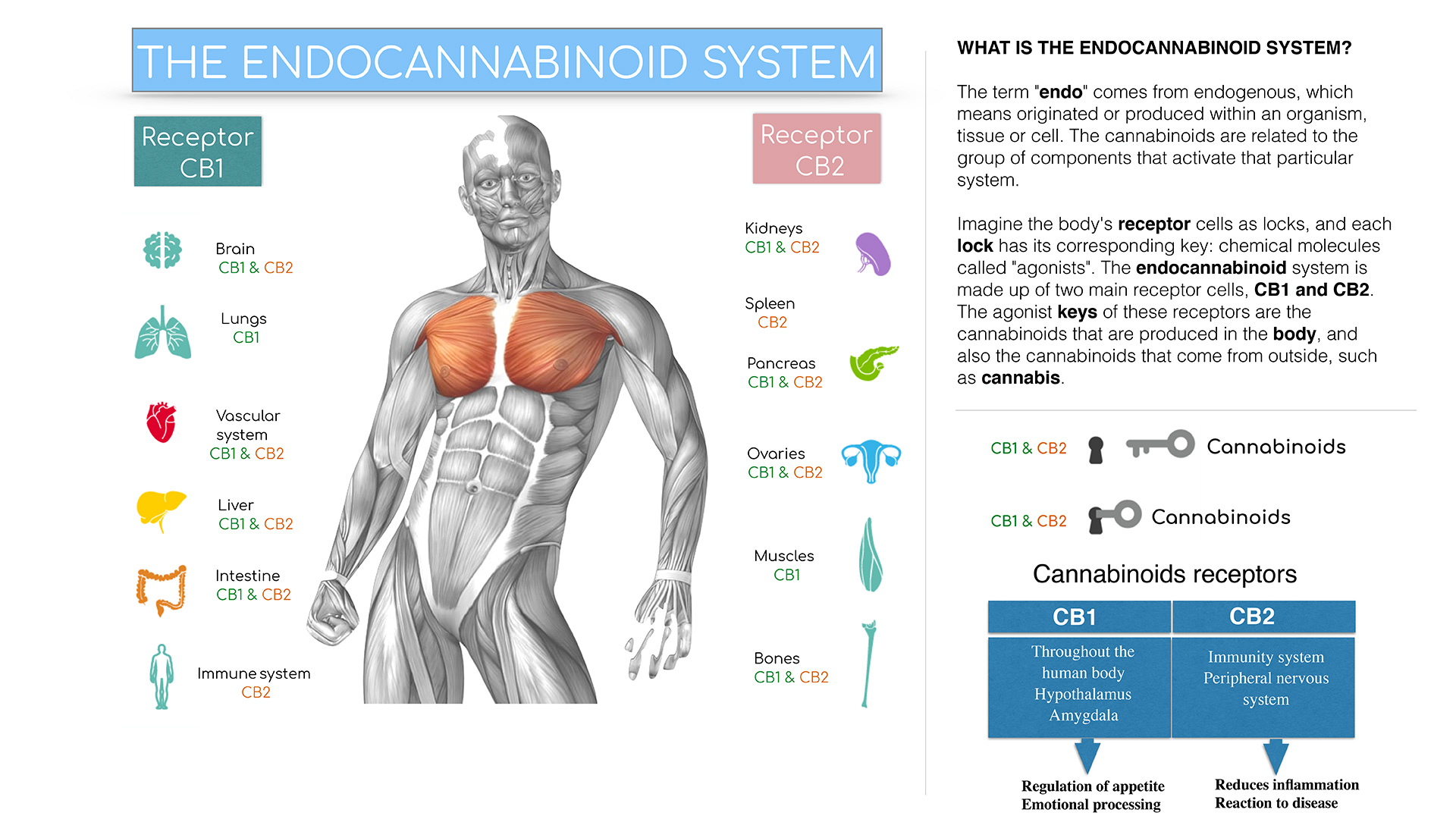What are cannabinoids?
Very simply, we can say that the term cannabinoid generically refers to one of the substances found or extracted from […]
Cannabis Sativa is a plant with more than 500 chemical compounds, with more than 100 identified cannabinoids. Flavonoids, alkaloids, fatty acids and terpenes are in their formulation. The most studied phytocannabinoid compounds to date are cannabidiol, or CBD, and tetrahydrocannabinol, or THC.
Several researches today reveal the pharmacological properties of cannabis and prove its interaction with the endocannabinoid system, exposing its therapeutic potential for several diseases.
Cannabidiol is a phytocannabinoid without intoxicating properties. It has analgesic, anti-inflammatory, antioxidant, anxiolytic, antidepressant, anticonvulsant, bone stimulant, anti-nausea, neuroprotective capabilities and has an immunomodulatory effect. CBD also modulates the negative effects of THC, such as those related to unwanted psychoactive events, such as anxiety, depression or hallucinations.
THC, known as tetrahydrocannabinol – a phytocannabinoid with psychoactive properties, responsible for the sensations described as euphoria and loss of recent memory -, also has important medicinal properties. It is a potent stimulant of hunger, muscle relaxant, sedative, analgesic, anti-nausea and vomiting (mainly those induced by chemotherapy), anti-inflammatory and for some people it has a positive effect on mood.
However, it is not without side effects. They often prevent some patients from using it, due to effects such as anxiety, depression, momentary increase in heart rate and, as I said earlier, it can impair recent memory.
Current studies, in animal models and cell cultures, prove the antitumor properties of cannabinoids. Research carried out by a large pharmaceutical company in Great Britain, specializing in research with the Cannabis Sativa plant for medicinal use, concluded at the end of a study with neuro-oncological patients that cannabis had a positive effect on the survival of this population.
For those who have never heard of it, we humans and a range of other animals (including mammals and even invertebrates) have a system within our body called endocannabinoid.

The endocannabinoid system plays an important role in several biochemical reactions in the human body. It is closely related to our homeostasis process (internal balance). The endocannabinoid system consists of cannabinoid receptors, called CB1 and CB2, their endogenous ligands, the endocannabinoids, which mimic phytocannabinoids, and the proteins involved in their synthesis and degradation.
It is as if this system were a communication between the brain and the human body. It is involved in several physiological processes, such as the modulation of all endocrine axes, the modulation of pain, the regulation of motor activity, the control of cognitive processes, the modulation of the inflammatory and immune response, the antiproliferative action on tumor cells, the control of the cardiovascular system, among others.
The endocannabinoid system also plays an extremely important role in modulating appetite, food intake and energy balance. Peripheral organs such as adipose tissue, liver, skeletal muscle and gastrointestinal tract are also related to it.
If there is such a complex system, could the medical use of medical cannabis, that is, “phytocannabinoids”, also be able to intervene negatively?
Several studies have already proven that phytocannabinoids are safe and do not harm healthy cells. On the contrary, in cancer cells for example, they have antiproliferative, anti-migratory action and cause cell death. In healthy cells, they are related to cell growth and survival (in neurons, for example).

Discover the benefits of using medical cannabis during cancer treatment. Improve-ments in appetite, nausea, vomiting and treatment-related pain.
CBD also works in cases of anxiety attacks. Learn to identify if your anxiety is in-creasing and understand what factors may be influencing it. Whatever the reason, CBD can help you improve this situation.
Chronic pains of a neuropathic origin or due to inflammatory processes can be trea-ted with medical cannabis. Watch the video to see how this substance works in your organism.
Check out the myths and truths about the treatment of chronic diseases using canna-bidiol. Find out which type of treatment works best for you.
Autoimmune diseases are more common than you think. See how medical cannabis can help in this type of situation.
Medical cannabis can help with chronic inflammatory diseases. Watch this and find out how it can benefit those suffering from this condition.
Very simply, we can say that the term cannabinoid generically refers to one of the substances found or extracted from […]
One of the areas in which medical cannabis contributes most to quality of life is that of patients with chronic […]
Cannabinoids are molecules of low toxicity. Its controlled use is safe and presents low risks to users who use it […]
It´s never enough to reaffirm that our view of medicine is not limited to managing the symptoms of a disease. […]
There are records of cannabis cultivation as early as 8000 BCE, and the first report of its medicinal use was […]